FOR THE LOVE OF SOIL EDUCATION DAY JUNE 6TH
May 13, 2015
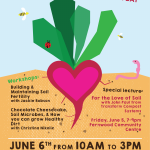
Special lecture and workshops to celebrate compost, the “heartbeat” of our soil!
Continue reading “FOR THE LOVE OF SOIL EDUCATION DAY JUNE 6TH”
Posted in Blog, Events, Featured, NewsMay 13, 2015

Special lecture and workshops to celebrate compost, the “heartbeat” of our soil!
Continue reading “FOR THE LOVE OF SOIL EDUCATION DAY JUNE 6TH”
Posted in Blog, Events, Featured, NewsNovember 13, 2014

Continue reading “Just Eat It Premiere!”
Posted in Blog, Events, FeaturedLeave a Comment on Just Eat It Premiere!August 13, 2014
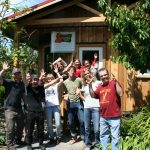
The Basics:
The Compost Educator Program (CEP) is a comprehensive volunteer training program that has been offered by the Centre since 1992.
The CEP includes 10 hours of classroom, practical, and hands-on instruction. It is spread over the course of two Saturdays.
The next session will take place on Saturday September 20 from 10am-3pm and Saturday September 27 from 10am-3pm.
Space is limited to 15 participants per session.
Cost is $50.
To reserve your space in the Compost Educator Program, please email Clare at education (a) compost.bc.ca or register online HERE.
Features of the training:
Following the training course, volunteers can lend their skills to the Centre as community educators and site volunteers.
Volunteer opportunities include:
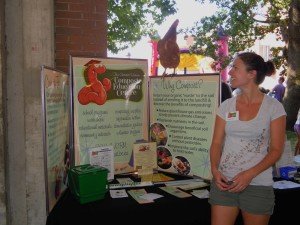 Community outreach volunteering involves staffing the Compost Education Centre mobile displays when we attend different events throughout the CRD, such as:
Community outreach volunteering involves staffing the Compost Education Centre mobile displays when we attend different events throughout the CRD, such as:
Community outreach is a powerful tool to spread the ‘dirt’ on composting. It’s a great experience for all involved.
 Garden volunteering is a great opportunity to learn new skills and help out in the gardens at the Compost Ed Centre! Work bees are held on the first Saturday of every month from 12:30-3:30. Each one is focused on a relevant task in the garden for that month of the growing season. We begin with a short theory lesson to give some background on the task and then get dirty applying the new knowledge in the garden.
Garden volunteering is a great opportunity to learn new skills and help out in the gardens at the Compost Ed Centre! Work bees are held on the first Saturday of every month from 12:30-3:30. Each one is focused on a relevant task in the garden for that month of the growing season. We begin with a short theory lesson to give some background on the task and then get dirty applying the new knowledge in the garden.
July 31, 2014
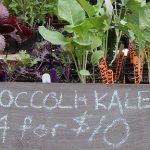
Here at the Compost Education Centre, we always enjoy watching beautiful starts leave the sale to find their new homes in gardens around town. We’ll be hosting our second plant sale of the year on Saturday August 16th from 10am-1pm. This is a great opportunity to pick up some great veggie starts such as broccoli, kale and chard varieties for healthy winter eating!
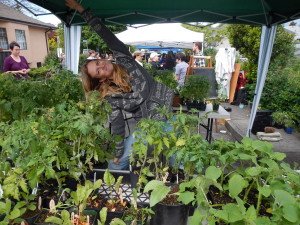
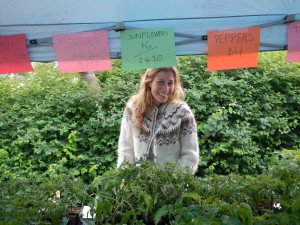
July 31, 2014
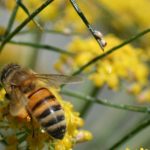
We are excited to offer a 2-for-1 special on our August workshops! For the month of August, all Compost Club members who take a workshop can bring a friend along for free. When registering online, simply purchase your workshop ticket as you usually do, then choose the option to bring along a friend at no cost. Looking forward to seeing you and your pals at these fantastic events!
You can choose from two awesome August workshops for the promotion:
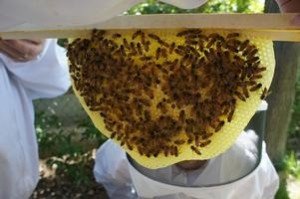 Natural Beekeeping
Natural Beekeeping
1:00pm-4:00pm
August 9th
Are you curious about how to get started with natural backyard beekeeping? Join Tara Beninger, local beekeeper extraordinaire, to learn all about effective and natural beekeeping. Topics will include advantages of different hive designs, how to build an effective hive for our specific climate, natural approaches to bee health, bee-friendly hive management, and more! To register, click here.
 Aquaponics
Aquaponics
1:00pm-4:00pm
August 23rd
Aquaponics is an efficient, sustainable system that produces both fish and hydroponic vegetables! We will examine the development of aquaponics, techniques, new innovations and home-scale projects for the sustainable urban gardener. A range of potential crops and fish will be discussed, and we will also cover different materials and where to source them. The main focus will be on freshwater home systems, with the Compost Centre’s demonstration garden providing a practical example. We will also take a tour of the large-scale aquaponics system at Mason Street City Farm just a few blocks away from the Compost Education Centre! To register, click here.
Posted in Blog, EventsLeave a Comment on August is ‘bring a friend for free’ month!
June 23, 2014
June is the month where things settle into their boots (or roots, if you will) and start to show off everything they’ve got. I recently took a walk around the garden on the Summer Solstice to capture some of the sweet moments that are currently happening. Think nasturtiums, calendula, borage, phacelia, arugula flowers, Johnny Jump Ups and a king-size mullein! (Click on the photos for larger, more glorious images)
Many of the flowers pictured here are deliberately planted as companions for the vegetables nearby. Calendual and nasturtiums act as pest traps, attracting aphids away from squash and brassicas. Borage and phacelia attract pollinators (like the bumble bee doing the splits above!) to squash, tomato, and cucumber flowers. And Johnny Jump Ups and roses bring joy to pretty much anyone who stops to spy or sniff them. Welcome to summer everyone!
Posted in Blog, FeaturedLeave a Comment on Solstice Beauty
June 11, 2014
We’ve recently planted a garden to provide food and habitat for pollinators and other beneficial insects here at the Centre. The goal of this garden is to provide forage for these little helpers throughout the growing season. Plant varieties were selected based on flowering time (spring/summer/fall), colour, flower shape, and species they attract.
Scroll on down to check them out and don’t forget to drop by the Centre on June 14th for Pollination Education Day!

Bergamont (Monarda spp.) – Also called “Beebalm”, these plants flower late in the summer and on into fall. Wild Bergamont (Monarda fistulosa) has light purple flowers, whereas its ornamental cultivar (Monarda didyma) come in spectacular reds and pinks. The leaves of this plant are very fragrant and can be used as a tea.

Chamomile (Matricaria chamomilla) – Known for its calming effect on the nervous system, not only is this herb great as a tea, but its flowers also attract a host of beneficial insects. Flowers in the summer; ladybugs are attracted to it.

Wild Columbine (Aquilegia canadensis) – this native species is often seen in woodlands. It flowers earlier than many others and so is wonderful to have in a pollinator garden to extend the forage season. It attracts butterflies, bumblebees and humming birds.

Comfrey (Symphytum spp.) – We can’t get enough of this multi-functional plant at the Compost Education Centre! Comfrey is not only a powerful medicinal, its flowers make the bees go crazy! Flowers in the spring through to early summer.

Lavender (Lavandula angustifolia) – Another medicinal that’s good for us and the good for bees! Any lavender will do, the fragrant purple flowers attract bees, hoverflies and butterflies.

Lungwort (Pulmonaria spp.) – This spotty-leaved, violet-flowered plant was chosen because of its early spring bloom time. Most flowers we are familiar with bloom in the summer, and beneficial insects need food before then. Lungwort flowers in early spring and provides food for bees.

Sweet Cicely (Myrrhis odorata) – We were lucky to have this gorgeous, useful flower volunteer in our pollinator garden! Sweet Cicely flowers are a perfect example of the “umbel” shape that is so critical for many beneficial insects. This shape provides a landing pad and easy access to lots of nectar inside each of the tiny individual flowers. Not only this, but Sweet Cicely’s anise-flavoured seeds and leaves can be used as an alternative sweetner, as a tea or just to snack on. Please make sure you have a positive ID for this plant if you come across something that looks similar in the wild, there are poisonous look alikes!

Tansy (Tanacetum vulgare) – Tansy’s flowers are also easy to land upon and their brilliant yellow is beautiful in the garden. Tansy flwoers in the summer and attracts lacewings.

Yarrow (Achillea millefolium) – Once again, we see the umbel flower shape here. Yarrow flowers in the summer and attracts ladybugs, hoverflies and parasitic mini-wasps who will munch on damaging caterpillars. Yarrow leaves and flowers can also be used as a tea to ease menstrual cramps and ease digestion.
Posted in Blog, FeaturedLeave a Comment on New Beneficial Insect Garden!